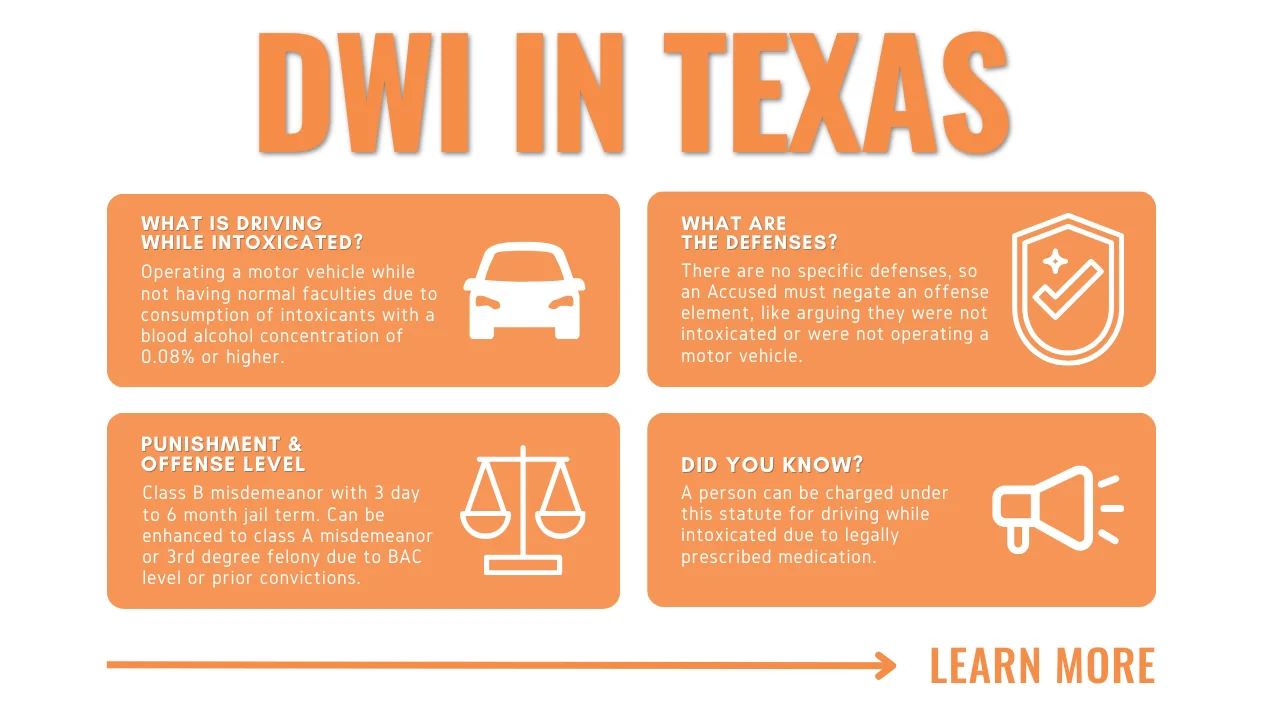
DUI is when a minor under the legal drinking age of 21 operates a motor vehicle with any detectable amount of alcohol in their system. DUI (Driving Under the Influence) is a class C misdemeanor crime punishable by a maximum $500 fine, alcohol awareness, community service, and a driver’s license suspension in some instances.
DWI is when any person operates a mother vehicle while intoxicated, which means having a Blood Alcohol Content of at least 0.08 percent, or having lost normal mental or physical faculties due to alcohol or other intoxicants, including legal drugs and Marijuana. DWI is a class B misdemeanor crime (unless enhanced) punishable by up to 6 months jail and a $3,000 fine. In some circumstances, DWI is punishable as a felony with the possibility of prison.
The distinguishing feature, for those still unsure of the difference between DWI and DUI in Texas, is that DUI is only an offense for minors as there is zero tolerance for minors drinking alcohol. A person older than 21 cannot commit DUI in Texas as it is legal for them to drive with alcohol in their system so long as they are not intoxicated.
- Can a minor be charged with DWI? Yes, minors can be charged with DWI if they consume enough alcohol to become legally intoxicated. Texas law defines intoxication as having a Blood Alcohol Content of 0.08 percent or greater, or having lost the normal use of mental and physical faculties due to intoxicants. So while operating a vehicle with low levels of alcohol in their system can lead to DUI (Driving Under the Influence) charges, minors who consume greater amounts of alcohol are subject to greater DWI penalties.
- What is the difference between OVI and DWI? Some states create different penalties for either driving or operating a vehicle while intoxicated, as well as different Blood Alcohol Content thresholds for drunk driving offenses. Ultimately all states prosecute drunk driving though it’s not always called the same thing. For example, some states use the terminology Operating a Vehicle while Intoxicated (OVI), while others, like Wisconsin and Michigan use the term Operating While Intoxicated (OWI). Texas uses the term Driving While Intoxicated. The laws of a specific jurisdiction will define the evidence a prosecutor needs to substantiate a case.
WHAT HAPPENS ON YOUR FIRST DWI IN TEXAS?
The punishment for first DWI in Texas includes costly fines, lengthy probation, an ignition interlock device (breathalyzer), a suspension of driving privileges, and even long jail sentences in some cases. A first-offense DWI is a class B misdemeanor crime that can also result in a permanent criminal conviction, which is devastating for financial professionals, teachers, nurses, and military members in Texas .
- What is the most common penalty for DUI? Another difference between DUI and DWI in Texas is the punishment range. The most common sentence for a first DUI (Driving Under the Influence) is a maximum $500 fine, court-imposed community service, alcohol education, and a driver’s license suspension in some cases. DUI is punishable as a class C misdemeanor crime except for certain repeat offenders who are subject to a maximum $2,000 fine and 6 month jail sentence.
- Will a DUI show on a background check? Yes, DUI and DWI appear permanently on criminal background checks in Texas unless they are expunged. Expungement is a powerful legal tool that can delete eligible criminal records in Texas. While there are significant differences between DUI and DWI in Texas, they both show on criminal backgrounds and should be expunged as soon as possible.
IS THERE A DIFFERENCE BETWEEN DUI AND DWI IN TEXAS?
Yes, there is a difference between DUI and DWI in Texas as they are separate crimes. DUI is part of Texas’ zero tolerance policies against underage drinking, and is punishable under Section 106.041 of the Texas Alcoholic Beverage Code which stipulates:
A minor commits an offense if the minor operates a motor vehicle in a public place, or a watercraft, while having any detectable amount of alcohol in the minor’s system.
DWI is punishable under Texas Penal Code 49.04 which provides:
A person commits an offense if the person is intoxicated while operating a motor vehicle.
Texas Penal Code 49.01 defines intoxication in this context as:
(1)Not having the normal use of mental or physical faculties by reason of the introduction of alcohol, a controlled substance, a drug, a dangerous drug, a combination of two or more of those substances, or any other substance into the body; or (2) having an alcohol concentration (Blood Alcohol Content) of 0.08 or more.
The ultimate difference between DWI and DUI in Texas is that DUI only applies to minors under the legal drinking age of 21: a minor can be charged with DWI if they become intoxicated but an adult can never be charged with DUI (Driving Under the Influence).
- Is DWI worse than DUI in Texas? DWI generally carries more severe penalties than DUI in Texas. This is another difference between DUI and DWI. DUI is punishable as a class C misdemeanor with a maximum $500 fine, while DWI is a class B misdemeanor (unless enhanced) subject to a maximum $3000 fine and 6 months jail.
- What is the lowest DUI limit? A minor who operates a motor vehicle with any detectable amount of alcohol in their system, including the odor of intoxicants, is subject to DUI in Texas. A minor with a 0.08 Blood Alcohol Content or greater is subject to DWI in Texas.
WILL I GO TO JAIL FOR DWI IN TEXAS?
Any DWI offense is subject to jail as punishment. However, an effective DWI defense can mitigate many consequences and secure probation, Deferred Adjudication, a reduction, or even a dismissal in certain circumstances.
- Will I go to jail for first DUI Texas? A major difference between DUI and DWI in Texas is that jail is not a punishment for DUI (Driving Under the Influence). A first DUI is a class C misdemeanor punishable by a $500 fine only while a first DWI carries a maximum 6 month jail sentence as a class B misdemeanor.
- How long does a DUI stay on your record in Texas? A DUI (Driving Under the Influence) stays permanently on criminal records in Texas. Even a dismissed DUI will appear permanently on a criminal background check unless it is expunged. Expungement is a powerful legal tool that deletes all records of eligible criminal cases.
CAN YOU DRIVE IN TEXAS AFTER A DWI?
Yes, Texas Defendants can drive following a DWI arrest though many will be subject to an ALR suspension proceeding with the Texas Department of Public Safety. Motorists with suspended licenses may also drive with an Occupational Driver’s License in Texas.
- Do you lose your license immediately after a DUI in Texas? Similar to adults with DWI charges, minors arrested for DUI (Driving Under the Influence) are also subject to a driver’s license suspension with the Texas Department of Public Safety. However, the suspension does not immediately go into effect as minors are provided 15 days to contest this action.
WILL MY COLLEGE SEE MY DUI?
Colleges, universities, and financial aid programs have access to all publicly available criminal records. College criminal history questionnaires are nuanced, so those asked to report criminal conduct should carefully review the relevant question and consult an attorney. In many cases colleges can impose discipline for DUI, alcohol abuse, and Public Intoxication, including alcohol education and sobriety counseling. However, colleges cannot view properly expunged DUI (Driving Under the Influence) cases.
- Can I get a job with a DUI? DUI convictions harm job opportunities and negatively impact career advancement. It is critical to avoid a final conviction and protect your future at all costs.
TOP-RATED CRIMINAL LAWYERS IN TEXAS
Trey Porter Law is one of the highest and best rated criminal defense firms in Texas. Recipients of statewide and national recognition, the advocates at TPL know how to fight and win for their clients. With over 40 years of combined experience in every facet of criminal defense, TPL has delivered successful outcomes for thousands of Texans facing intoxication and criminal charges. From students to teachers, veterans to first responders, and professionals across varied industries, the firm brings a results-oriented & client-focused approach to solving complex problems. Learn more.















